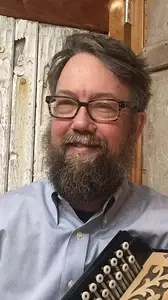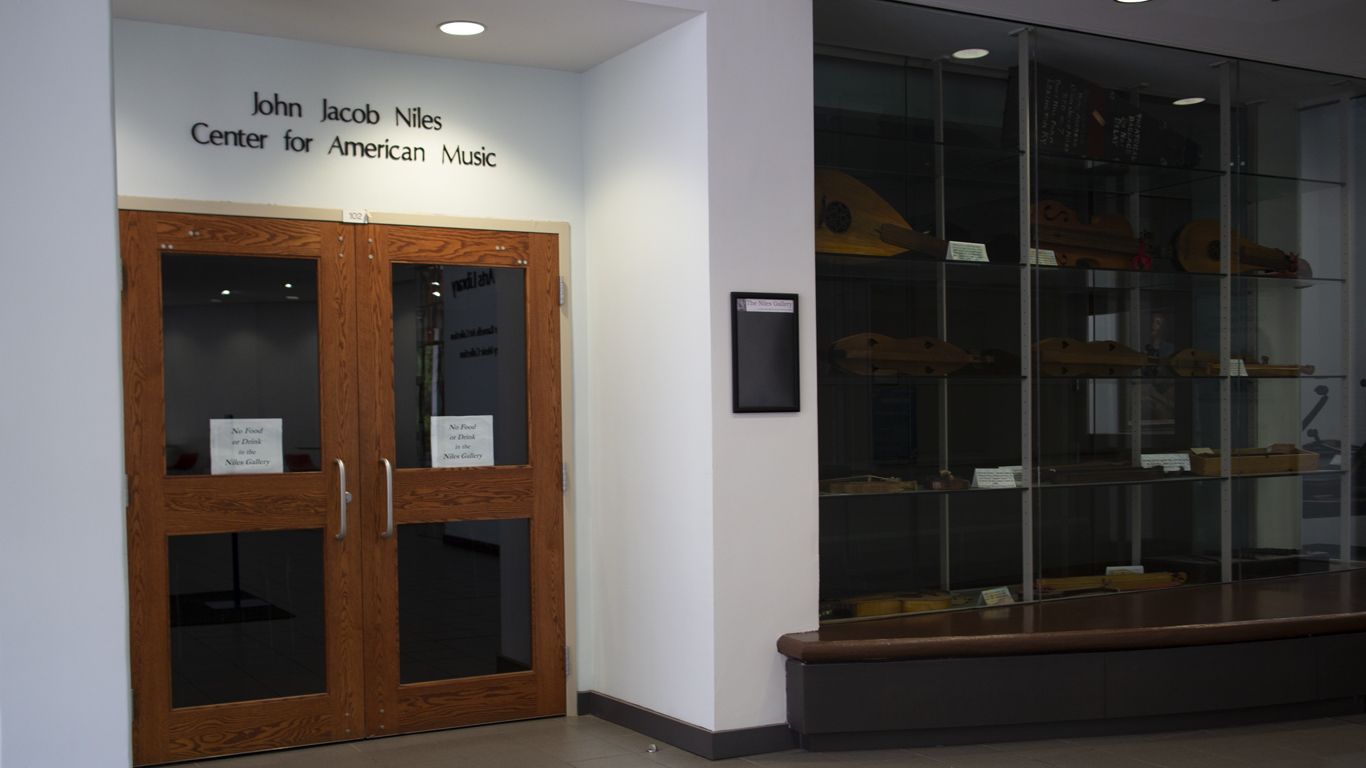James Revell Carr

Lucille Little Fine Arts Library, 160 Patterson Dr, Lexington, KY 40506

The John Jacob Niles Center for American Music
The John Jacob Niles Center for American Music is a collaborative effort of the University of Kentucky School of Music, the College of Fine Arts, the Appalachian Studies Program, and the University Libraries. It is named for Kentucky folklorist and composer John Jacob Niles whose family provided a generous gift to help establish the Center and its collections. The Center provides a focal point for the research and performance of American music, from the early Colonial period through the present, with special emphasis on the culture of the southern Appalachian region. The Niles Center serves as a repository for primary and secondary research materials, and actively supports the development and dissemination of scholarly research in American Music. The Niles Center also hosts guest lectures by leading scholars in American music studies, as well as numerous concerts and recitals in the Niles Gallery, including the Appalachia in the Bluegrass noon concert series every Fall semester.
Dr. Ron Pen, formally established The Center in 1997 and it moved into its dedicated space at the Lucille C. Little Fine Arts Library in 2000. The Niles Center’s programmatic and archival activities are funded primarily through three endowments: the Keith B. MacAdam Endowment for American Music, the American Music Library Acquisition Endowment, and the “Our American Music” Endowment. The Center consists of the Niles Gallery, a 50-seat performance and lecture space, a “Green Room” with a small listening and reading library used as a support space for the Gallery, and the Niles Study Room, which provides an attractive space for private research using collections of the Niles Center. The Director of the Niles Center, Dr. James Revell Carr, maintains an office adjacent to the Green Room and accessible to the Gallery. The Rare Book storage facility of the Little Library adjoins the Director’s Office and is used for Little Library special items as well as various Niles Center archives.
The Niles Gallery is the heart of the Niles Center. Located off the lobby of the Lucille Caudill Little Fine Arts Library, the Gallery provides an elegant space for lectures, colloquia, readings, recitals, and other small musical events. The centerpiece of the Gallery is the Niles Steinway, built in 1953 and lovingly restored in 2019, it was John Jacob Niles’ personal instrument and was played by him and his many guests at his salon at Boot Hill Farm for decades. Today it is a favorite of soloists and accompanists alike for its “magical” action and sound. The Center’s display case facing the Library’s lobby contains a collection of unique dulcimers, some made and played by John Jacob Niles, others made by master dulcimer builders like Homer Ledford and Uncle Ed Thomas, as well as other handmade instruments and objects relevant to the Niles collections. Also featured in the gallery are panels made from rough-hewn doors carved by John Jacob Niles.
Events scheduling for the Niles Gallery is managed by the Little Fine Arts Library. There is configurable chair seating for 50, baby grand piano, podium, projection screen, and movable divider panels. Since the pandemic, events that take place in the Niles Gallery are often livestreamed and/or uploaded to the Center’s page on YouTube.

The Reading Room is used by scholars who are exploring the collections of the Niles Center and other special collections in the Fine Arts Library. It is also used for meetings and student conferences. The Reading Room is decorated with paintings and portraits from the Niles Collection, as well as tables that once furnished Boot Hill Farm, the home of John Jacob Niles and his wife Rena. One of the tables is decorated with the titles of some of the traditional ballads that Niles collected in Kentucky, carved by Niles in his distinctive hand. The reading room also houses a Hardman baby grand piano that belonged to the Niles family.
The collections of the Niles Center are always growing, thanks to our American Music Library Acquisition Endowment. This endowment is used to purchase rare books, manuscripts and ephemera that compliment our earlier collections, but also expand our holdings in new directions. Among some of the most interesting recently acquired materials are a complete run of the foundational folk fanzine Little Sandy Review (1959-1965), the manuscript diary of a young queer country musician from Kentucky, and numerous rare 19th century books on social dancing. The Center is always looking for new materials to collect, either through donation or purchase. If you have or know of something that you think would make a great addition to our collections, you can contact the Center’s director at revell.carr@uky.edu.
The collection includes:

John Jacob Niles (1892-1980) was an early and influential collector of Kentucky folk music and was one of the first scholars to publish examples of Appalachian folk music collected “in the field.” Known as “the Dean of the Balladeers,” Niles also had an extensive career as a performer with an electrifying, eccentric style. He was a pioneer among folklorists and ethnomusicologists who study the Appalachian region, as well as among performers who used American folk music as a wellspring for their own compositions, like Bob Dylan, Joni Mitchell, Jerry Garcia, and many others. These two sides of Niles’ work and life guide the John Jacob Niles Center’s embrace of both the scholarly and the performative, the professional and the amateur, the traditional and the innovative tendencies in American Music.
The first comprehensive biography of Niles, I Wonder as I Wander: The Life of John Jacob Niles, by former Niles Center director Dr. Ron Pen, was published in 2010 by University Press of Kentucky.
Composer, collector, and balladeer John Jacob Niles, was born in Louisville, Kentucky April 28, 1892. By 1907, Niles composed his first song, "Go 'Way from My Window," based on a line of song collected from an African American farm worker.
During the first World War, Niles enlisted in the U.S. Army Signal Corps and served as a reconnaissance pilot in Europe. The war enabled him to continue collecting folk songs, resulting in the publication of two books, Singing Soldiers (1927) and Songs My Mother Never Taught Me (1929). After the war he stayed in France, briefly studying at the Schola Cantorum. He later returned to the United States where he studied at the Cincinnati Conservatory and then moved to Chicago where he sang with the Lyric Opera and performed on Westinghouse radio.
In 1925 Niles moved to New York and published his first music collections, Impressions of a Negro Camp Meeting (1925) and Seven Kentucky Mountain Songs (1928). Niles also began performing traditional mountain and African American material in concert with contralto Marion Kerby. At the same time, Niles worked with photographer Doris Ulmann and accompanied her on four trips into the southern Appalachian Mountains which allowed him to continue the ballad collecting that eventually culminated in The Ballad Book (1961).
In 1936, after a brief tenure as Music Director at the John C. Campbell School in Brasstown, North Carolina, Niles married Rena Lipetz and returned to Kentucky, settling at Boot Hill Farm near Lexington. He recorded the compilations Early American Ballads (1938) and Early American Carols and Folksongs (1940) for RCA Victor's "Red Seal" label. By this time he had composed the songs "I Wonder As I Wander," "Black is the Color of My True Love's Hair," and "Jesus, Jesus, Rest Your Head." In the 1950s he turned his efforts to the composition of art song and extended concert works, such as the oratorio Lamentation (1951) and the remarkable Niles-Merton Songs (1967-70) based on the poetry of Thomas Merton.
Niles maintained an active performance, composition, and recording career until his death March 1, 1980. He is buried next to his wife, Rena, in the graveyard of St. Hubert's Episcopal Church in Clark County, Kentucky.

James Revell Carr, Assistant Professor of Ethnomusicology and Musicology , studies the importance of travel and commerce in the development of hybrid music and dance cultures. His major interests include sea chanteys, Anglo-American balladry, Hawaiian music, folk music revivals, and improvisational rock. Carr's first book, Hawaiian Music in Motion: Mariners, Missionaries, and Minstrels(University of Illinois Press, 2014), about the musical exchange between American sailors and Hawaiian musicians in the nineteenth century, was a co-recipient of the Society of Ethnomusicology’s Alan P. Merriam Prize for outstanding book in ethnomusicology for 2015. Before coming to University of Kentucky, Dr. Carr was Associate Professor of Ethnomusicology at the University of North Carolina at Greensboro, where he founded the UNCG Old Time Ensemble. Before that he was an Interpretive Specialist Park Ranger at San Francisco Maritime National Historical Park, an educator at Mystic Seaport Museum in Connecticut, and curated major exhibits at the Columbia River Maritime Museum in Oregon.
Events scheduling and space management is handled by UK Libraries. The John Jacob Niles Gallery is housed within the Little Fine Arts Library on the first floor. See the UK Libraries page for more information on accessibility.